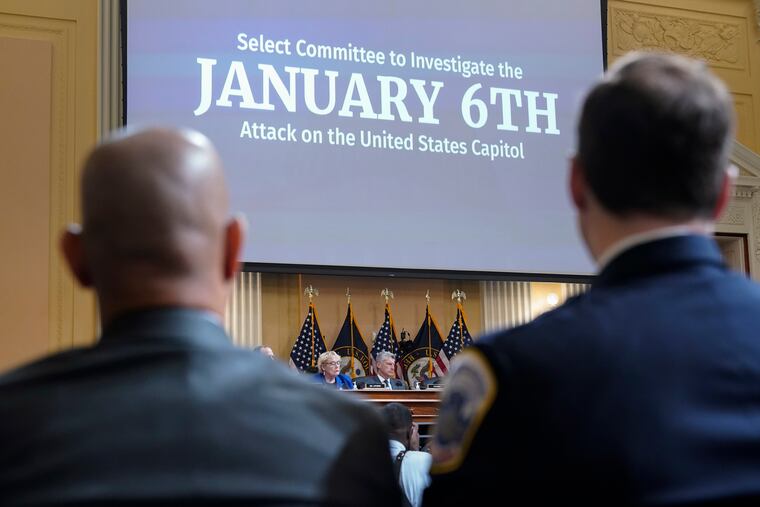As Election Day nears, Jan. 6 committee hearing serves as a reminder that democracy is on the ballot | Editorial
This may sound to some like hyperbole, but it isn’t: Supporting Trump allies and election deniers will place the future of American democracy in jeopardy.

The House select committee’s ninth and likely final hearing involving the Jan. 6, 2021, insurrection at the U.S. Capitol cemented the case that former President Donald Trump and his supporters plotted a coup.
In a normal world, Trump would be charged with insurrection and seditious conspiracy for his lead role in the Jan. 6 attacks, or at least barred from holding elected office again under Section 3 of the 14th Amendment.
However, in a normal world, Trump would have been convicted of abuse of power and obstruction during his first impeachment trial, or of high crimes and misdemeanors at his second impeachment trial. Then again, someone so obviously unfit for office never would have been elected president, and instead banished to the dustbin of history.
As the next election nears, front and center of every voter’s mind should be this central premise: Supporting Trump allies and election deniers will place the future of American democracy in jeopardy.
That may sound to some like hyperbole, but it isn’t. The recent House committee hearing showed Trump had a premeditated plan to claim he won the November 2020 election before all the votes were tallied. The facts compiled by the House committee are clear, yet Republican leaders and millions of voters choose to believe otherwise.
» READ MORE: As GOP extremists seek office, the cancer of election denial threatens to spread | Editorial
Trump adviser Roger Stone, a convicted felon later pardoned by Trump, brazenly told a documentary filmmaker about Trump’s election plan: “The key thing to do is to claim victory. Possession is nine-tenths of the law.”
Steve Bannon, another convicted Trump adviser, who was pardoned but now faces state money laundering charges, likewise told associates that Trump planned to claim he won, even if he lost. “What Trump’s gonna do is just declare victory … but that doesn’t mean he’s a winner,” Bannon said, laughing. “He’s just gonna say he’s the winner.”
And that’s exactly what happened. In the early morning hours after Election Day, as many mail-in votes were still getting counted, Trump went on TV and declared: “Frankly, we did win this election.”
Stone and Bannon also spelled out in blunt terms how the insurrection that followed was also part of the plan.
“Let’s get right to the violence,” Stone said at one point.
» READ MORE: Scott Perry, Jeffrey Clark, and the lingering threat of Jan. 6 enablers | Editorial
That, too, happened. At least seven people died in connection to the Jan. 6 insurrection. The rioters caused nearly $3 million in damage to the Capitol. Millions more have been spent to prosecute the more than 900 rioters who have been charged so far.
The toll on American democracy is still mounting.
Trump continues to falsely claim the election was stolen — despite acknowledging in private that he lost. Key advisers, election officials, the Justice Department, and more than 50 state and federal judges told Trump there was no fraud. But rather than admit defeat, Trump continues to subvert the election system that is at the core of our democracy.
The House select committee deserves credit for painstakingly gathering more than 140,000 documents and interviewing more than 1,500 people to create a record surrounding the Jan. 6 insurrection — though many key witnesses refused to testify.
Tellingly, the committee’s star witnesses were Republicans. The committee member who distinguished herself the most was Rep. Liz Cheney, a Republican stalwart from Wyoming. Perversely, Cheney’s principled stand got her voted out of office. But she forever remains on the right side of history.
» READ MORE: Liz Cheney’s lonely fight against the extremist wing of the GOP | Editorial
The same can’t be said for most other Republican officials, and the many members of the party’s extremist wing.
Initially, Senate Minority Leader Mitch McConnell (R., Ky.) said Trump was “morally responsible” for the Jan. 6 riot and called his actions a “disgraceful dereliction of duty.” Likewise, days after the attack, House GOP leader Kevin McCarthy said Trump “bears responsibility” for the violence and should resign. “I’ve had it with this guy,” McCarthy said.
But fearing Trump’s wrath, McConnell and McCarthy — along with nearly every other Republican official — have since changed their tune. They are now enabling a broader seditious conspiracy aimed at our election system. More than 300 GOP election deniers are on the November ballot, including at least 10 in Pennsylvania.
With Trump as its leader, the extremist wing of the GOP remains a threat to American democracy.
The Jan. 6 House select committee did its sworn duty. Now it is up to Democrats, independents, and any remaining patriotic Republicans to vote against elections deniers and to push to hold Trump and his enablers accountable.